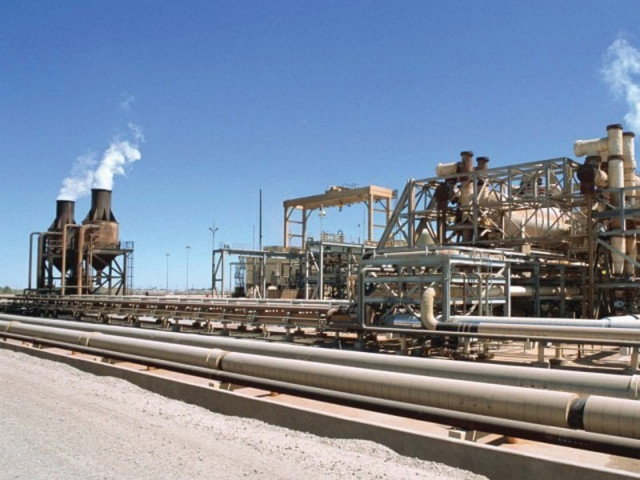Harassing one, facilitating the other
Regulator, investigating agency silent over rise in share prices of gas utilities

With the new guidelines, the economic decision-makers have targeted the consumers and provided relief to the companies, where the money was stuck due to stay orders granted by courts. PHOTO: FILE
In a country like Pakistan, regulators are often used to harass businessmen to benefit some others.
Recently, the government approved policy guidelines to recover billions of rupees from consumers and inject them into gas distribution companies – Sui Northern Gas Pipelines Limited (SNGPL) and Sui Southern Gas Company (SSGC). However, a similar move during the previous government of Pakistan Peoples Party (PPP) was called a mega scam, leading to the arrest of the then chairman of the Oil and Gas Regulatory Authority (Ogra).
If the recent trading in shares of gas utilities and the resultant price rise are closely looked at, it becomes clear that the investigation into the so-called mega scandal is aimed at victimising a business tycoon of Karachi to benefit other big guns, who are reportedly close to the present government.
Some of the big guns will certainly benefit from the policy guidelines approved by the Economic Coordination Committee (ECC) a couple of months ago and are waiting for their implementation.
Under the guidelines, gas consumers will be forced to bear the burden of Rs49 billion on account of a higher cost of gas theft and leakages. At the same time, share prices of gas utilities have gone up and are likely to continue soaring in coming days. Some business tycoons are major shareholders in these companies, who are reaping a windfall with the price surge.
Data shows MCB Bank is a major shareholder in SNGPL having 8.69% (55.12 million) shares, National Bank of Pakistan (NBP) owns 8.06% (51.12 million) shares, Pakistan Industrial Development Corporation holds 6.02% (38.16 million) shares and SNGPL Employees Empowerment Trust has 4.32% (27.40 million) shares. The number of major shareholders in SNGPL is 167.
In SSGC, the SSGC Employees Empowerment Trust owns 7.25% shares, State Life Insurance Corporation holds a 6.56% stake, NBP has 3.35% shares, Viability Gap Fund holds 1.93% shares, Arif Habib Corporation has 1.42% shares and Arif Habib Limited has 1.14% shares.
Two big guns bought SSGC shares when the price ranged between Rs19 and Rs22 and after the approval of guidelines the price went up to around Rs39.
Keeping mum
In spite of the substantial rise in share prices, the Securities and Exchange Commission of Pakistan and the National Accountability Bureau (NAB) have kept mum. However, a similar price increase had sparked a probe following the approval by Ogra in 2010 of an increase in the unaccounted-for-gas (UFG) ceiling to 7%, which covers gas theft and leakage suffered by the gas utilities.
According to the fresh guidelines, a change in the bulk-retail ratio with 2003-04 as base year will result in a substantial rise in UFG.
In 2003-04, bulk consumers constituted 56% of the total while retail consumers were 44%. At present, bulk consumers account for 28% of the total whereas retail consumers comprise 72%. Retail consumers are said to be the major cause of UFG losses.
Other measures included the cost of gas pilferage by unregistered consumers, volume consumed in law and order-stricken areas, volume against minimum billing and income from non-core activities.
The cumulative impact of all these measures will effectively take UFG to around 8%, which will be recovered from the consumers, who are already paying bills and will pay billions of rupees more.
Scandal raises eyebrows
This suggests that the mega scam at the regulator may be a myth. Former Ogra chairman Tauqeer Sadiq had approved the same initiatives to steer the gas utilities out of trouble following pressure from the PPP government.
Following the increase in UFG ceiling from 5% to 7%, the gas transmission and distribution firms earned an additional Rs49 billion. NAB, however, termed it a scam. In the Supreme Court, the accountability bureau put the size of the scandal at Rs82 billion, but later reduced it to Rs26 billion in a reference submitted to the National Accountability Court.
NAB was seeking to recover the extra collection of Rs49 billion from the gas companies, but with the new guidelines the economic decision-makers have targeted the consumers and provided relief to the companies, where the money was stuck due to stay orders granted by courts.
The writer is a staff correspondent
Published in The Express Tribune, January 12th, 2015.
Like Business on Facebook, follow @TribuneBiz on Twitter to stay informed and join in the conversation.


















COMMENTS
Comments are moderated and generally will be posted if they are on-topic and not abusive.
For more information, please see our Comments FAQ